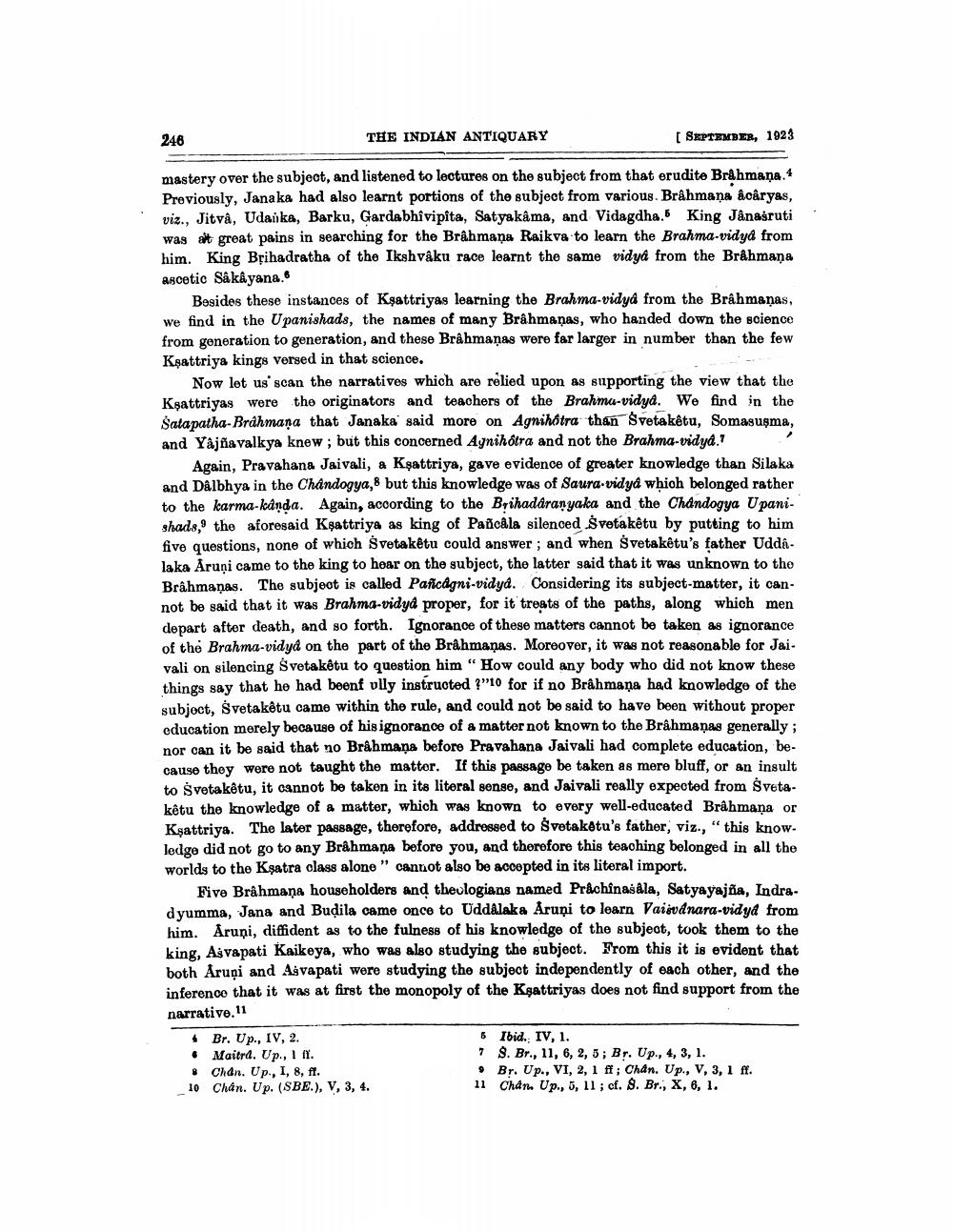________________
246
THE INDIAN ANTIQUARY
mastery over the subject, and listened to lectures on the subject from that erudite Brahmana.4 Previously, Janaka had also learnt portions of the subject from various. Brahmana âcâryas, viz., Jitva, Udanka, Barku, Gardabhîvipita, Satyakâma, and Vidagdha. King Jânašruti was at great pains in searching for the Brahmana Raikva to learn the Brahma-vidya from him. King Brihadratha of the Ikshvâku race learnt the same vidya from the Brahmaṇa ascetic Sâkâyana.
Besides these instances of Kṣattriyas learning the Brahma-vidya from the Brahmanas, we find in the Upanishads, the names of many Brahmanas, who handed down the science from generation to generation, and these Brahmaņas were far larger in number than the few Kṣattriya kings versed in that science.
[SEPTEMBER, 1923
Now let us scan the narratives which are relied upon as supporting the view that the Kṣattriyas were the originators and teachers of the Brahma-vidya. We find in the Satapatha-Brahmana that Janaka said more on Agnihotra than Svetakêtu, Somasusma, and Yajnavalkya knew; but this concerned Agnihotra and not the Brahma-vidya."
Again, Pravahana Jaivali, a Kṣattriya, gave evidence of greater knowledge than Silaka and Dalbhya in the Chandogya,8 but this knowledge was of Saura-vidya which belonged rather to the karma-kânda. Again, according to the Brihadaranyaka and the Chandogya Upanishads, the aforesaid Kṣattriya as king of Pañcâla silenced Svetakêtu by putting to him five questions, none of which Svetakêtu could answer; and when Svetakêtu's father Uddalaka Aruni came to the king to hear on the subject, the latter said that it was unknown to the Brahmanas. The subject is called Pañcâgni-vidyd. Considering its subject-matter, it cannot be said that it was Brahma-vidyd proper, for it treats of the paths, along which men depart after death, and so forth. Ignorance of these matters cannot be taken as ignorance of the Brahma-vidyd on the part of the Brahmanas. Moreover, it was not reasonable for Jaivali on silencing Svetakêtu to question him "How could any body who did not know these things say that he had beenf vlly instructed ?"10 for if no Brahmana had knowledge of the subject, Svetakêtu came within the rule, and could not be said to have been without proper education merely because of his ignorance of a matter not known to the Brahmanas generally; nor can it be said that no Brahmana before Pravahana Jaivali had complete education, because they were not taught the matter. If this passage be taken as mere bluff, or an insult to Svetakêtu, it cannot be taken in its literal sense, and Jaivali really expected from Svetakêtu the knowledge of a matter, which was known to every well-educated Brahmana or Kṣattriya. The later passage, therefore, addressed to Svetaketu's father, viz., "this know. ledge did not go to any Brahmana before you, and therefore this teaching belonged in all the worlds to the Ksatra class alone" cannot also be accepted in its literal import.
Br. Up., IV, 2.
Maitra. Up., 1 ff.
Five Brahmana householders and theologians named Prachinasala, Satyayajña, Indradyumma, Jana and Budila came once to Uddalaka Aruņi to learn Vaisvanara-vidyd from him. Aruņi, diffident as to the fulness of his knowledge of the subject, took them to the king, Asvapati Kaikeya, who was also studying the subject. From this it is evident that both Arupi and Asvapati were studying the subject independently of each other, and the inference that it was at first the monopoly of the Ksattriyas does not find support from the narrative. 11
6
8 Chan. Up., I, 8, ff.
10 Chân. Up. (SBE.), V, 3, 4.
5 Ibid., IV, 1.
7 S. Br., 11, 6, 2, 5; Br. Up., 4, 3, 1.
Br. Up., VI, 2, 1 ff; Chân. Up., V, 3, 1 ff. Chân Up, 5, 11 ; cf. 8. Br., X, 6, 1.
11




